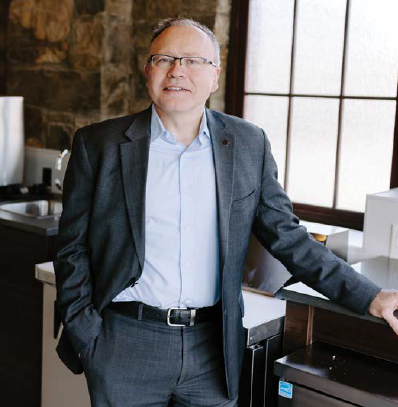By Kim Dishongh
Usually when a university president discusses growth, he is referring to academics, student enrollment or budgets. Richard Dunsworth, president of the University of the Ozarks in Clarksville, has plenty to say about those topics — but he might also share updates on his crops. He put in a garden behind the president’s residence on the edge of campus and he regularly enjoys the fruits — and vegetables — of his labor.

Ozarks, put a garden on the edge of campus.
In recent years, he has worked to cultivate partnerships geared toward making it easier for everyone in the area to access fresh, locally produced foods, and is now leading a university initiative to open a farm-to-table restaurant and taproom in a historic building within easy walking distance of campus.
“The front of the building will be a place to be able to buy fresh produce and things made and grown here in Arkansas. You can also grab a cup of coffee and a bagel and maybe some ice cream and things of that nature,” said Dunsworth. “But it’s all designed around how to support Arkansas growers and Arkansas entrepreneurs.”
“We’re partnering with our city and our chamber of commerce to locate the community farmer’s market there,” said Dunsworth.
“Let’s say you’re a small farm and you’ve got produce of some kind that you bring into the farmer’s market. You sell everything you can and then you can go into the warehouse and package it for sale in the market, or you might decide to drop it in the dehydrator or the freeze dryer so you don’t lose it,” said Dunsworth. “In many ways it’s all about knowing where your food comes from and being able to shake hands with somebody who you know produced the meat and vegetables you’re eating.”
“Dr. Kim Van Scoy, who ultimately built a sustainable agriculture minor here at the university, started a community garden,” says Dunsworth.
Van Scoy, who retired last year, called it the Food for Thought garden.
“The class decided they wanted to call the garden the Food for Thought garden because we would hopefully help provide food in our local community, which would help with the fact that we were a food desert,” said Van Scoy. One third of the produce from the garden was donated to a school backpack program, serving children in Clarksville schools, where about 70 percent of students qualified for free and reduced lunches. Another third was sold in a farmer’s market and the remainder went to the students who worked in the garden.
Dunsworth explained that the university is better situated to absorb some of the risks that, for small businesses, might be catastrophic.
“What we’re trying to do is lend our knowledge of what we know about running nonprofits, what we know about business and marketing, what we hope our students can learn in this process,” he said. “Let us be the hub that just puts a whole lot of spokes out there and supports small farms that are kind of a side gig, a secondary opportunity for people to make money, and the outcome is for our students, who may not have ever understood where food really comes from to maybe understand a little bit more.”
